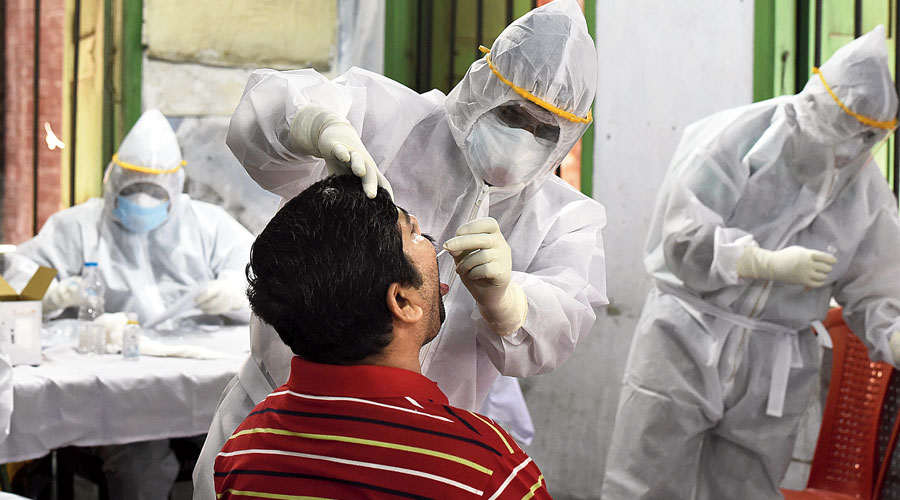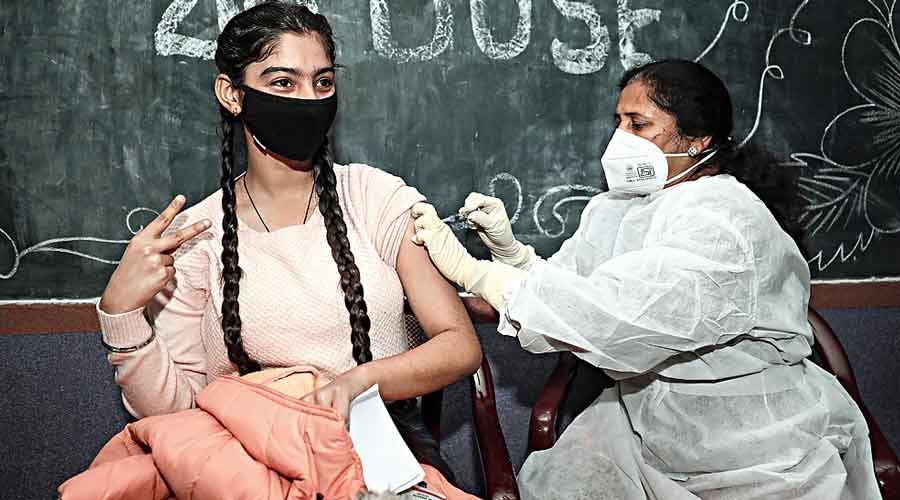The Union health ministry on Thursday advised hospitals not to delay surgeries on Covid-19 patients, citing observations that surgical procedures during the current omicron-driven wave have not shown the increased risk of complications or death observed during earlier waves.
“The present data indicate that unlike evidence during earlier surges, with the current variant, surgery is safe and not associated with higher chances of complications or death in Covid-19-positive patients,” said Lav Agarwal, joint secretary in the health ministry.
But multiple medical experts said that while the advice from the health ministry was probably well-intentioned, it had the potential to sow confusion among patients and was unlikely to alter surgical practices that had over the months adapted to Covid-19.
Agarwal cited an analysis of the surgical outcomes on 53 Covid-19-positive patients at the All India Institute of Medical Sciences, New Delhi, between December 20 last year and January 20 this year.
Thirty-two of these patients had surgery under local anaesthesia and experienced no complications. Among the 21 others who were administered general anaesthesia, four died — but the deaths were caused by infection or bleeding not linked to Covid-19.
Agarwal contrasted the surgical outcomes in the 53 AIIMS patients with the observations of a global study — carried out during October 2020 on 140,000 patients from 116 countries — that showed a four-fold increase in the post-surgical mortality risk among Covid-19 patients.
Also, a US study on several hundred patients in May last year had noted a four-fold increased risk of post-surgical complications in Covid-19 patients, Agarwal said.
But experts said that contrasting the surgical outcomes on 53 AIIMS patients with observations on tens of thousands of patients from earlier international studies was akin to comparing apples with oranges.
“Comparisons between such disparate datasets are invalid,” said Chandra Gulhati, a senior pharmacologist and editor of the Monthly Index of Medical Specialities.
S.P. Kalantri, professor of medicine at the Mahatma Gandhi Institute of Medical Sciences, Wardha, too questioned the health ministry advisory.
Kalantri and other doctors said omicron had mainly caused self-limiting and mild upper respiratory illness with less than 4 per cent of the patients requiring hospitalisation and an even lower proportion requiring critical care.
Because the illness caused by omicron is mild, affecting mainly the upper respiratory tract, and the risk for complications is low, the patients are likely to have the same risk of post-operative complications as those negative for Covid-19, Kalantri said.
However, he said, it “won’t be proper to vouch for the safety of surgery during the omicron wave based on a sample of just 53 patients”.
Kalantri also underlined that 26 of the 53 patients at AIIMS had undergone Caesarean sections — an operation associated with very low incidence of adverse post-operative outcomes, Covid-19 or no Covid-19.
The deterrents for surgery are signs of lower respiratory infection and inflammation such as high-grade fever or cough or lung involvement, said Jacob John, a community medicine specialist at the Christian Medical College, Vellore. But he too said that data from 53 patients would be too meagre for inferences.
Surgeons and critical care specialists said that hospitals had long adapted to Covid-19 by asking the infected patients to wait anywhere from seven to 14 days if they needed elective surgery — a planned operation for a non-emergency condition such as a gall stone or a fractured hip.
“We would typically ask a Covid-19-positive patient to wait — if the procedure can be postponed,” said Aakanksha Chawla Jain, a critical care medicine expert at the Apollo Indraprastha hospital, New Delhi.
“Covid-19 can impact the patient’s body — thus for elective procedures, we prefer to wait 14 days.”
But throughout the pandemic, surgeons have carried out emergency surgeries whenever they needed to be done, said Sanjay Jain, president of the Association of Indian Surgeons. Both these practices, he said, are likely to prevail — immediate emergency surgeries and a precautionary wait for elective surgeries.











